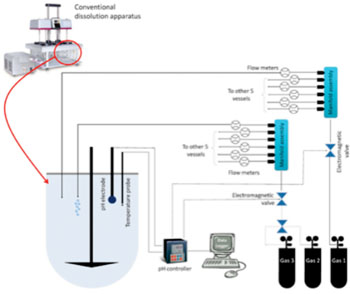Novel Apparatus Mimics the Human Digestive System for Oral Drug Studies
By LabMedica International staff writers
Posted on 16 Apr 2014
A team of British drug developers has created an instrument that mimics the human digestive system, which will allow them to accurately determine how orally-administered medications are dissolved and then absorbed.Posted on 16 Apr 2014
Investigators at the University of Huddersfield (United Kingdom) sought a way to study the behavior of oral drugs in the digestive tract that would avoid the differences between the digestive systems of humans and laboratory animals.

Image: Diagram of the apparatus for testing drug solubility (Photo courtesy of the University of Huddersfield).
To this end, they developed an apparatus for testing drug solubility that included a chamber for holding a solvent medium —often a bicarbonate based buffer system—as well as a pH probe connected to tanks of carbon dioxide and helium.
The heart of the apparatus was the control unit that monitored changes in pH of the solvent medium and, as appropriate, fed pH increasing and/or pH reducing gas from the tanks into the chamber. The control unit was able to maintain a uniform pH during testing or could be set to provide a dynamically adjustable pH range, for example to three or more different pH levels in order to test the performance of a drug carrier at different levels of acidity or alkalinity.
“By minimizing human trials we would reduce the cost of development, which is then charged to patients when the drug comes to the market—if the development costs are lower, then we can make new drugs more affordable,” said Dr. Hamid Merchant, senior lecturer of pharmaceutics at the University of Huddersfield.
Related Links:
University of Huddersfield













